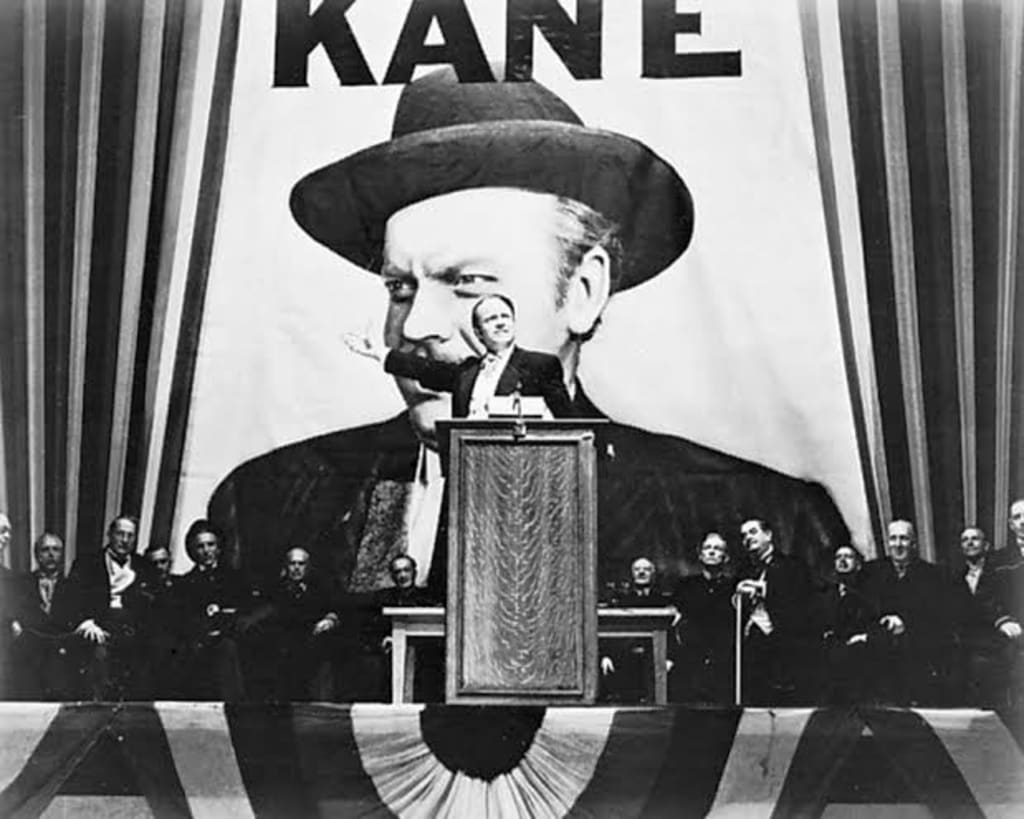
Citizen Kane directed and starring Orson Wells is considered a classic film as the story is intriguing, the cinematography is masterful and the parts are well casted. It is impossible to watch Citizen Kane and not be instantly pulled in to the fantastic life of Charles Kane. At first the way the story jumps from period to period in the characters life can be a bit confusing but once Kane’s story begins to be established it becomes easy to follow.
The film begins at the end of the life of Charles Kane. Laying in his bed about to die Kane holds a snow globe and utters his final words “rosebud”. Immediately after passing his hand lowers and the snow globe falls to the floor. The snow globe falling also provides a transition into the following scene. This was the first of many transitions shot in a masterful way and part of how cinematographer managed to keep the stories visual momentum flowing throughout the entire film.
Following the death scene, a narrator for a news reel begins to tell the story of who Kane was and how he was perceived at his time of death. He explains the history of Xanadu where Kane spent his final days, how the location was created and the extravagance it embodied. News outlets wanted to know more about the Kane’s, in particular the meaning of his final word. A reporter is given the task to investigate, interviewing anyone who loved or hated Kane throughout his life.
First the reporter attempts to interview Kane’s second wife Susan. She is upset from her ex-husband’s passing and refuses to talk to the reporter. He then proceeds to the archive of a deceased banker named Mr. Thatcher. Thatcher had written memoires stored in the archive that told the story of the early years of Kane and how his mother had become instantly wealthy when gold was found on property she owned. Mrs. Kane employed Thatcher to setup a trust for her son and become his legal guardian. The young Charles Kane played with his sled outside with a sled in the snow as his parents and Thatcher discussed and finalized the plan for him to be taken away.
The story then gained speed and a young Charles Kane received a sled for Christmas in the home of the Thatcher. The story then cut ahead to a point where Kane is in his 20’s and decided to take control of a small newspaper, the New York Inquirer. As the publisher of the paper, he had no issues in losing revenue and continually produced scandalous stories. The articles were primarily directed to attack Kane and Thatcher’s own business interests. Although Thatcher attempted to reason with Kane he did not care about the loss of revenue or income. Instead, he was quite happy to continue writing the stories.
The reporter then moved on to continue to interview Kane’s business manager Mr. Burnstein. Burnstein told the story of how Kane built the New York Inquirer up by onboarding journalists from a competitor paper. Kane moved into the office to cover news 24 hours per day. Although Kane seemed to be adamant about telling the news, he was using manipulation to peak public interest. At one point Kane suggests reporting a missing woman as a murder and staging the arrest of her husband.
The reporter then interviewed Kane’s former friend Jedediah Leland in a retirement facility. Leland goes talked about Kane’s first marriage and how it failed. Kane was caught having an affair with Susan while running for governor and the story was made into a scandal. The scandal ends up ruining Kane’s career in politics and his marriage. Shortly after that Kane married Susan and decided she should pursue a career in opera which she did not enjoy and was not suited for. Leland who worked for Kane at the time was writing a negative review about the Susan’s performance and Kane fired him for it. Kane still completed the negative review however and published it.
Susan then agrees to an interview and tells how she attempted suicide and that led to Kane allowing her to leave her career. She explained what life was like living with Kane in their mansion and how he kept her alone and under his control. Finally, Susan left him after no longer being able to tolerate the life they had. Kane became furious over her leaving and went on a rampage destroying all of her belongings. In this rampage Kane comes across a snow globe and said the word rosebud. This led to the end of the film where the reporter decides he can not solve the mystery of Kane’s final words. As the staff cleans out the mansion, they find the sled that Kane had played with as a boy and discard it into the furnace. While the sled burns the word rosebud appears and the film ends.
Telling the story in flashback made the recount of Kane’s life more interesting to watch. It added a sense of mystery to the film as the end of his life was already known but how Kane reached that point in life was not. Seeing the different stories from the perspectives of different people who were telling them added depth to the situations that were shown and added realism to the characters life. The version of the event would change depending on the view of Kane from the character telling the story. This makes all accounts significant because the story is shown from the perspective of all who were involved and effected. Although the film showed various points over the life of Kane and did not maintain chronological order it was still easy to follow the story once the concept was established.
Source:
Welles, Orson. Citizen Kane. New York: Mercury Theater for RKO Radio Pictures Corp, 1941.






Comments
There are no comments for this story
Be the first to respond and start the conversation.